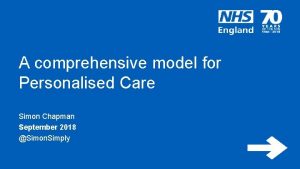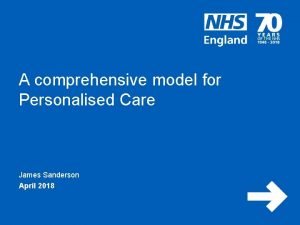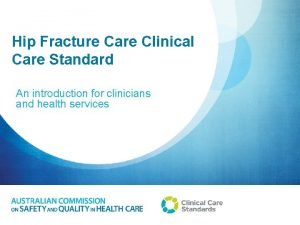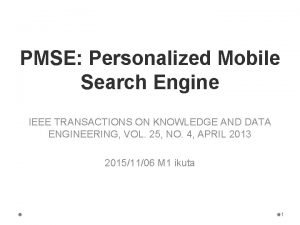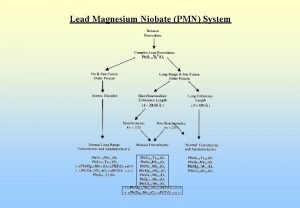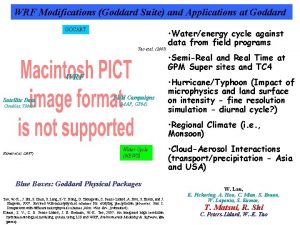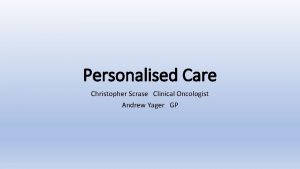Personalised Care Support Dr Dorothy Goddard Clinical Lead


![Mandate NHS Operational Planning and Contracting Guidance 2019/20 [ref] states the requirement to “Implement Mandate NHS Operational Planning and Contracting Guidance 2019/20 [ref] states the requirement to “Implement](https://slidetodoc.com/presentation_image/132d1dcaf9e32a5dbb08d0372914c1c7/image-3.jpg)










- Slides: 13

Personalised Care & Support Dr Dorothy Goddard, Clinical Lead SWAG Cancer Alliance Board 6 Sept 2019

The Long Term Plan With the anticipation of even better survival, service planning should take account of the fact that the number of people living with and beyond cancer will continue to increase significantly. This is a great success story, but it means growing strain on follow up clinics to keep pace with the number of people needing surveillance and ongoing care and support. Therefore, the Long Term Plan ambition is that “after treatment, patients will move to a followup pathway that suits their needs, and ensures they can get rapid access to clinical support where they are worried that their cancer may have recurred. This stratified follow-up approach will be established in all trusts for breast cancer in 2019, for prostate and colorectal cancers in 2020 and for other cancers where clinically appropriate by 2023”. "By 2021, where appropriate every person diagnosed with cancer will have access to personalised care, including needs assessment, a care plan and health and wellbeing information and support. [. . . ]. Over the next three years every patient with cancer will get a full assessment of their needs, an individual care plan and information and support for their wider health and wellbeing. ”
![Mandate NHS Operational Planning and Contracting Guidance 201920 ref states the requirement to Implement Mandate NHS Operational Planning and Contracting Guidance 2019/20 [ref] states the requirement to “Implement](https://slidetodoc.com/presentation_image/132d1dcaf9e32a5dbb08d0372914c1c7/image-3.jpg)
Mandate NHS Operational Planning and Contracting Guidance 2019/20 [ref] states the requirement to “Implement a stratified approach for follow up for breast cancer in 2019 and prostate and colorectal cancers in 2020 (expanding to all cancers which are clinically appropriate in 2023). ” The 2019/20 Appendix B regional assurance statement [ref] , that delivery plans should be in place, is “Ensure full implementation of breast cancer personalised (stratified) follow-up protocols by the end of 2019/20, so that from April 2020 approximately two-thirds of patients who finish treatment for breast cancer are on a supported self-management follow-up pathway. All Cancer Alliances should have in place clinically-agreed protocols for stratifying prostate and colorectal cancer patients and systems for remote monitoring by the end of 2019/20. ”

Implementing Personalised Stratified follow up (PSFU) This handbook reaffirms the principles of PSFU and aims to support Cancer Alliances and trusts in ongoing delivery of large-scale transformation of cancer care pathways to meet Long Term Plan ambitions. It complements existing resources such as the NCSI ‘How To’ guide 2013 [ref] and NICE cancer guidelines on follow up and surveillance and should therefore be read alongside such guidance. Implementation Framework (June 2019) sets out the approach STP’s/ICS’s are asked to take to create their five-year strategic plans by November 2019 covering the period 2019/20 to 2023/24. These plans should be based on realistic workforce assumptions and deliver all the commitments within the Long Term Plan.

Key Principles of a Personalised Stratified Follow Up Pathway

Guidance STPs/ICSs must ensure that commissioners and providers come together as part of their Cancer Alliance to agree and deliver PSFU as part of a system-wide plan for cancer PSFU requires safe and robust operational protocols to be clinically agreed and implemented, set within the context of the introduction of person-centred care in line with the Comprehensive Personalised Care model across the NHS, and the universal requirement for personalised care interventions (recovery package) from cancer diagnosis onwards. Personalised care interventions should be incorporated into all patient pathways from diagnosis by 2021. These include personalised care and support planning based on holistic needs assessments, health and wellbeing information and support, and end of treatment summaries (collectively formerly known as ‘recovery package’) at diagnosis and around end of treatment – normally with the secondary cancer care team who will be required capture the HNA activity for COSD purposes.

COSD data submission for Holistic Needs Assessments for people after Diagnosis Rationale - To ensure benefits of personalised care and support planning (based on HNA) are maximised for people after cancer diagnosis. HNA is a proxy for personalised care and support planning. In order to encourage increased use of HNA, trusts should aim to equal or exceed the previous quarter. The Programme recognise that some organisations use voluntary sector partners who do not have access to trust systems, and may not use an electronic tool. This is a gap in the COSD HNA record but will only be a small impact on the overall figures at this stage. Our focus currently is to ensure, where appropriate, people have HNA and personalised care and support planning at diagnosis and around end of treatment – these would not normally take place in the community but with the secondary cancer care team who should be capturing the HNA activity for COSD purposes. Definition - The number of holistic needs assessments recorded in the quarter for people after a (i) breast; (ii) colorectal; (iii) prostate; and (iv) other cancers diagnosis. The respective ICD 10 codes included are (i) C 50 and D 05; (ii) C 18, C 19 and C 20; (iii) C 61; and (iv) all other C and D codes including in situ, benign and uncertain/unknown behaviour.

Protocol development Workforce and system roles and responsibilities The secondary care team is responsible for carrying out all aspects of PSFU, except where local protocols have been specifically agreed for certain aspects to be done in primary care. Support workers are increasingly employed to help support PSFU pathways. Primary care’s role is to ensure they are aware of the follow up pathways their patients are on, and to follow advice provided by secondary care in the Treatment Summary. Data collection. Alliances are required to provide assurance about progress towards NHS planning requirements on PSFU (see page 7). Part of this assurance includes local audit of adherence to PSFU protocols, starting with breast cancer in 2019/20 (see page 14). Alliances are also required to estimate how many outpatient slots are being released through the implementation of PSFU – an algorithm is provided to enable this estimate to be made.

Protocol Development cont. Content and agreement of PSFU protocols: These should be developed and written locally in order to take account of local procedures, contact details, referral forms etc. but should also follow NICE guidance (see below) and incorporate key components of the Comprehensive Model of Personalised Care and the personalised care interventions (see page 11) described in this Handbook. The 2013 Stratified Follow Up How To guide provides further detail. Some Cancer Alliances have agreed a protocol for Alliance-wide adoption, but each trust remains responsible for clinical governance.

Protocol development cont. Funding. At the earliest opportunity Alliances to enable agreement on sustainable funding for patient-facing and surveillance activity within PSFU pathways. PSFU is likely to be cost saving in the long run although this is not the principle reason for implementing it – being able to meet rising demand (by release OP capacity) and providing improved patient experience and outcomes are the major drivers. Incentives may be agreed in the form of CQUIN payments etc. Cancer Alliance Transformation Funding may be available to support project work, IT costs etc. Future CQC cancer service inspections will cover PSFU and the integral personalised care interventions. PSFU in other cancers The NHS Long Term Plan sets the ambition for PSFU to be rolled to other cancers as appropriate. A number of trusts are already using supported self-managed pathways in gynaecology, skin, haematology, head and neck, testicular and thyroid cancers. Alliances and trusts are encouraged to roll out to other cancers, as This Handbook will be revised in 2020 to provide additional guidance.

Funding, levers and incentives The NCSI 2013 How To Guide provides advice on addressing financial issues. The key is to engage with commissioners at the earliest opportunity to enable agreement on sustainable funding for patient-facing and surveillance activity within PSFU pathways. PSFU is likely to be cost saving in the long run although this is not the principle reason for implementing it – being able to meet rising demand within limited capacity and providing improved patient experience and outcomes are the major drivers.

Funding, levers and incentives National OPD algorithm to calculate release of fu’p when applying risk stratified protocols - (YDH). The YDH PSFU protocol in place for some years now has demonstrated approximately 60 -70% of patients are released to a self-managed pathway. The algorithm calculated for 275 new diagnoses, a release of approx. 1000 OP appointments’ in year, and 1000 each year onwards for multiple cohorts. 2019/20 tariff for consultant led outpatient follow-up is £ 135. 04 = 135 K per annum CRC only In 2018/19, 4586 patients in BNSSG were diagnosed with ‘good prognosis cancer type’ as a cancer type where at least 50% patients survive at least 10 years from diagnosis. If 50% of those diagnosed (2293) were placed on self-management pathways saving 5 consultant led outpatient appointments over 5 years, then the potential saving to BNSSG healthcare community would be £ 1, 548, 234 per annum.

Funding, levers and incentives SWAG Commissioning meeting held 27 July 2019 – Review commissioning guidance and expected deliverables as part of NHS Long Term Plan and National Position; Consensus how paramount the Recovery Package is to cancer care and commissioner support for the pc model in SWAG; agreement to work collaboratively to support system wide solution. Follow Up meeting Mon 9 September for CCG progress National Personalised Care (PC) team plan to develop a guidance pack to support commissioners to embed PC interventions including PSFU. The guidance pack will aim to share case-studies, stating the commissioning, finance and contracting levers that have been implemented nationally National PC commissioning and levers working group meeting on 9 th September - to identify best practice and evidence Guidance to be published November 2019
 Comprehensive model of personalised care
Comprehensive model of personalised care Comprehensive personalised care model
Comprehensive personalised care model Comprehensive model of personalised care
Comprehensive model of personalised care Comprehensive model of personalised care
Comprehensive model of personalised care Hip fracture clinical care standard
Hip fracture clinical care standard Personalised mobile search engine
Personalised mobile search engine Personalised fortification
Personalised fortification Personalised customer communication
Personalised customer communication Primary, secondary, tertiary care
Primary, secondary, tertiary care Lead magnesium niobate
Lead magnesium niobate Lisa goddard columbia
Lisa goddard columbia Cheryl gramling
Cheryl gramling Nasa ski club
Nasa ski club Goddard heating and air
Goddard heating and air
